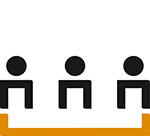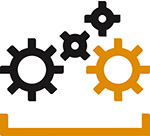BAG RelEx: origins, objectives and methods
The German Council on Preventing Extremism or BAG RelEx (abbreviation of the German term “Bundesarbeitsgemeinschaft religiös begründeter Extremismus”) is a non-profit organisation established by 25 civil society organisations in November 2016. Their motivation was to provide those working to support democracy and prevent religiously motivated extremism with a platform for networking, knowledge sharing and facilitating ongoing development while also creating a body that would represent the interests of such organisations.
Alongside far-right radicalisation, religiously motivated radicalisation has come to pose a significant challenge to German society since the early 2000s. Religiously motivated extremism, often wrongly called religious extremism, is one of many forms of extremism. What these different extremist tendencies have in common is a rejection of core democratic values. They range from anti-democratic and anti-pluralist attitudes within everyday life to the potential for or actual use of violence. In addition, such beliefs offer easy answers to complex issues, explaining them as straightforward choices between right and wrong. This simplicity can make them attractive, particularly to adolescents and young adults, though their appeal is by no means limited to these age groups. Personal, social and political factors are also typically key in understanding why people are drawn to such ideologies and movements. Radicalisation processes are complex and multi-layered, which is why monocausal explanations will always fall short. Instead, we need approaches to and programmes for countering radicalisation that are equally multi-faceted.
Now boasting over thirty member organisations across Germany, BAG RelEx brings together a broad range of approaches and methods and reflects its members’ long-standing experience in the field. We provide our member organisations with a forum for exchanging expertise and also serve as a point of contact for other institutions and actors. Due to its current sociopolitical relevance, preventing Islamism is the key focus of our work. That is why we teamed up with Violence Prevention Network and ufuq.de to establish the Competence Network “Islamist Extremism” (KN:IX, 2020-2024). In addition, we engage with other forms of religiously motivated radicalisation, addressing the pedagogical and societal challenges they pose. Since autumn 2022, we have also been involved in the multi-agency project PrEval, which was set up to explore issues of evaluation and quality control in extremism prevention, democracy support and political education.
Want to learn more about our work?
Just send us an email and we’ll be happy to help.
Our objectives and methods
We see ourselves both as a platform for civil society actors and an interface between civil society, politics and the public. Networking, knowledge sharing and advancement are the key pillars of our work, along with the representation of our members’ interests:
- We facilitate the exchange of expertise and work with our member organisations to optimise materials and methods.
- Together with our member organisations, we continue to optimise quality standards in prevention work and exit support.
- We represent our member’s interests in dealings with political bodies and public institutions.
- Via services aimed at the general public, we build awareness of the need for civil society to engage with religiously motivated extremism.
- Our publications, specialist events and podcast provide information about trends and developments in the field of religiously motivated extremism and provide an overview of current debates.
Most of our information is in German but if you’re looking for English-language literature, we’ll be happy to help with that too.

Networking

Knowledge sharing

Advancement
Networking and knowledge sharing
In addition to facilitating networking and the sharing of expertise between civil society organisations working in the area of religiously motivated extremism, we also promote dialogue with actors from related fields that have a key role to play in ensuring such work is successful and sustainable. This not only strengthens knowledge sharing within civil society but also between its actors and politicians, authorities and researchers. To this end, we regularly bring together these various groups via organised events, such as:
- forums for the sharing of expertise among member organisations
- forums for sharing knowledge with actors from related fields
- publicly accessible panel discussions and symposiums
- panel discussions for politicians and the media
The aims of these events and formats include facilitating knowledge sharing between practitioners and researchers and providing a forum for presenting the latest research and practice-oriented findings.
Advancement
These various formats allow us to further develop the methodology of radicalisation prevention and to communicate relevant debates and trends in the field. They can help to:
- further increase professionalisation and ensure service quality within a demanding and socially and politically sensitive field
- develop criteria for successful prevention work
- educate the public about our work and about the impact of prevention activities around religiously motivated extremism
- support the ongoing development of prevention programmes and methods
- provide quality control for the various approaches within the field
- ensure civil society bodies working to safeguard democracy and prevent religiously motivated radicalisation and extremism benefit from sustainable, long-term support
For instance, we drew up Standards for Civil Society Engagement in Countering Religiously Motivated Extremism (PDF, in German) based on the experience and expertise of our member organisations and on approaches and learnings from related areas, such as prevention work around far-right extremism. These standards reflect the programmatic, technical and legal requirements of prevention work.
Extremism, in all its forms, is present in the digital space. To implement prevention programmes where the target group’s everyday life takes place, several online programmes have been created to complement established offline formats. We have therefore complemented the Standards for Civil Society Engagement in Countering Religiously Motivated Extremism with the publication Framework and Standards for Successful Online Prevention (PDF, in German). This publication gives an insight into the different approaches and methods of preventing violent extremism (PVE) in the digital space. The text is a result of intensive debate among the staff of online projects within the membership of BAG RelEx and offers insights into various approaches and methods. Download the English Summary (PDF) here.
What ist radicalisation and how does radicalisation prevention work?
Defending democracy and human rights – the cornerstones of our work
In our efforts to counter religiously motivated extremism, we make a clear distinction between religion and hostile ideology: no religion is inherently opposed to human rights or to democratic values and principles. As an organisation, we are confessionally and party politically neutral. We see it as our mission to stand up for democracy and to defend basic human rights as defined in:
- the Universal Declaration of Human Rights
- the EU Charter of Fundamental Rights
- the Basic Law of the Federal Republic of Germany
Alongside a commitment to democracy and constitutionality, the values outlined in the above form the cornerstones of our work. Those values include the respect for and protection of basic human dignity and the rights deriving from it. For more details, see the statutory framework.
We strengthen civil society
By “civil society”, we mean all the citizens of a country who are active in initiatives or organisations outside of state institutions or commercial entities.
At BAG RelEx, we bring together numerous civil society organisations dedicated to preventing religiously motivated extremism. The services provided by our member organisations range from democracy support, radicalisation prevention, anti-bias or intercultural work and family support to violence prevention, deradicalisation and exit support. Spread across Germany, they have developed widely varying approaches as befits their different locations and target groups.
Civil society groups are particularly important when it comes to strengthening democratic structures and countering radicalisation. As organisations active in prevention and deradicalisation work, they are rooted in their local communities, have direct access to relevant target groups and are often more trusted than state actors such as child welfare agencies, schools or the police. That’s why our member organisations are key partners for those seeking to help young people accept and embrace diversity in people’s social backgrounds and world-views.
We represent the interests of civil society bodies working in this field. We do this by participating in political discourse and voicing our members’ various concerns in our many conversations with politicians. Our objectives include ensuring this important area of work receives sustainable, long-term support.
We are part of the Competence Network “Islamist Extremism” (KN:IX)
In early 2020, we teamed up with ufuq.de and Violence Prevention Network (VPN) to establish the Competence Network “Islamist Extremism” (KN:IX). KN:IX provides us with a framework within which to assess and react to current trends in extremism prevention, distancing support and exit work and to promote innovative approaches within that field. There are three key pillars to KN:IX’s work:
- demand and trend monitoring
- analysis, evaluation and development
- knowledge transfer
As an umbrella organisation, we oversee the coordination of the KN:IX network. You can find more information about how KN:IX works on its website (German), along with details of the project’s events and publications.


